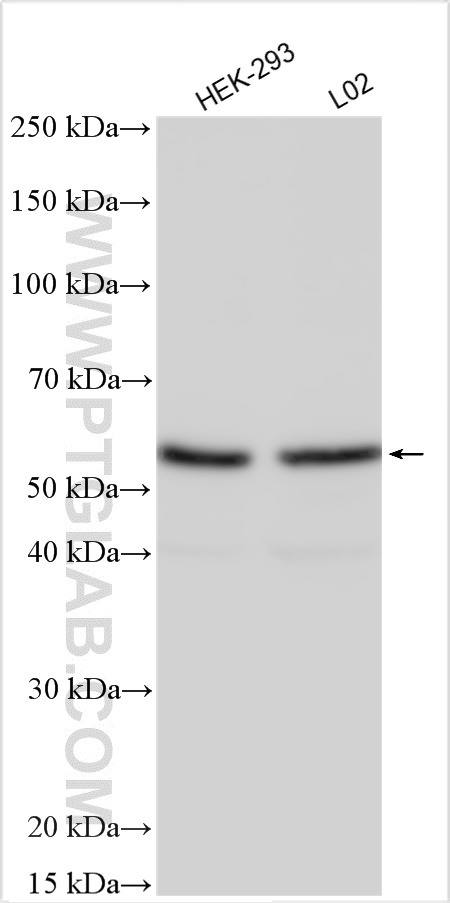验证数据展示
经过测试的应用
| Positive WB detected in | HEK-293 cells, L02 cells |
推荐稀释比
| 应用 | 推荐稀释比 |
|---|---|
| Western Blot (WB) | WB : 1:1000-1:6000 |
| It is recommended that this reagent should be titrated in each testing system to obtain optimal results. | |
| Sample-dependent, Check data in validation data gallery. | |
产品信息
22056-1-AP targets ZFP161 / ZBTB14 in WB, ELISA applications and shows reactivity with human samples.
| 经测试应用 | WB, ELISA Application Description |
| 经测试反应性 | human |
| 免疫原 | ZFP161 / ZBTB14 fusion protein Ag17082 种属同源性预测 |
| 宿主/亚型 | Rabbit / IgG |
| 抗体类别 | Polyclonal |
| 产品类型 | Antibody |
| 全称 | zinc finger protein 161 homolog (mouse) |
| 别名 | hZF5, ZBTB14, ZF5, Zfp 161, Zfp 5, ZFP161, Zinc finger protein 5 homolog, ZNF478 |
| 计算分子量 | 449 aa, 51 kDa |
| 观测分子量 | 55 kDa |
| GenBank蛋白编号 | BC110519 |
| 基因名称 | ZFP161 |
| Gene ID (NCBI) | 7541 |
| RRID | AB_3085683 |
| 偶联类型 | Unconjugated |
| 形式 | Liquid |
| 纯化方式 | Antigen affinity purification |
| UNIPROT ID | O43829 |
| 储存缓冲液 | PBS with 0.02% sodium azide and 50% glycerol , pH 7.3 |
| 储存条件 | Store at -20°C. Stable for one year after shipment. Aliquoting is unnecessary for -20oC storage. |
背景介绍
ZBTB14, also named as :ZFP161, ZNF478, is a 449 amino acid protein, which interacts with ZBTB21. ZBTB14, is a transcriptional activator of the dopamine transporter (DAT), binding it's promoter at the consensus sequence 5'-CCTGCACAGTTCACGGA-3'. ZBTB14 Binds to 5'-d(GCC)(n)-3' trinucleotide repeats in promoter regions and acts as a repressor of the FMR1 gene. The calculated MW of ZFP161 is 52 kDa, 22056-1-AP can detect a band around 55 kDa.
实验方案
| Product Specific Protocols | |
|---|---|
| WB protocol for ZFP161 / ZBTB14 antibody 22056-1-AP | Download protocol |
| Standard Protocols | |
|---|---|
| Click here to view our Standard Protocols |
